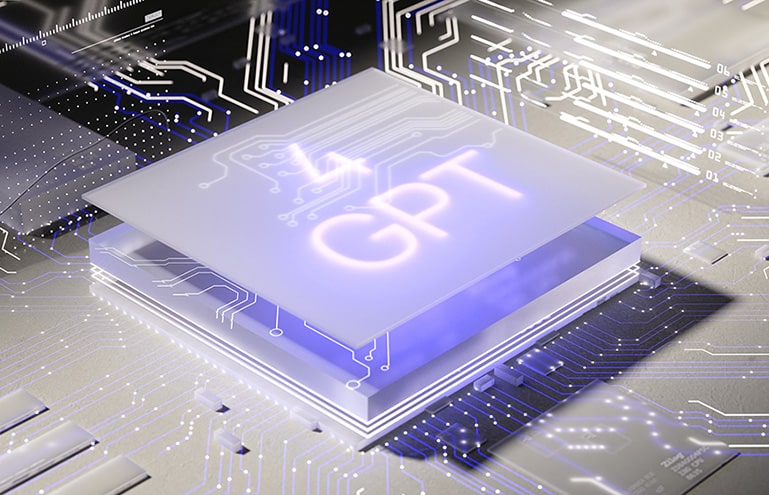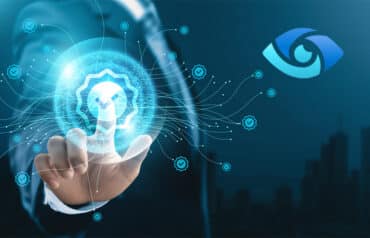Paul Roetzer, founder and CEO of Marketing AI Institute, answers Ruth Carter’s questions about the upside and downside of AI for lawyers.

Table of contents
Artificial intelligence has erupted in the last few months with software like ChatGPT gaining widespread popularity. However, AI is nothing new. Paul Roetzer, the founder and CEO of Marketing AI Institute, has been working with AI for more than a decade and been a consultant for hundreds of organizations, from startups to Fortune 500 companies. Paul is also a world-renowned speaker and the author of “Marketing Artificial Intelligence.”
Paul had a few minutes this month while on a cross-country flight to a speaking engagement to field some questions on how AI can make lawyers more efficient — or harm their practice.
Let’s Start With Some AI Basics
What Is It, What Does It Do?
How would you define AI?
Paul Roetzer (PR): My favorite definition comes from Demis Hassabis, co-founder and CEO of Google Deepmind: “AI is the science of making machines smart.”
This means that the software we use has the ability to learn, make predictions and take actions on our behalf. And it continually improves or becomes smarter as it captures more data.
What AI tools are people likely already using in their everyday lives?
PR: We use AI dozens of times every day in our personal lives and don’t even know or think about it. Examples include: Netflix recommending shows, Spotify learning the music you love, Gmail finishing your sentences, TikTok personalizing the For You page, Amazon predicting your next purchase, and Apple unlocking the iPhone with your face.
A lot of lawyering involves cutting and pasting from previously created documents, which for me often means wracking my brain about which client file has the document I need. How can AI help lawyers like me be more efficient with these types of repetitive tasks?
PR: Intelligent automation of repetitive tasks is one of the main benefits of AI. For lawyers, or anyone who reviews and creates a lot of documents, AI can help tag, classify, summarize, write, rewrite and edit text, saving countless hours (and dollars).
Can AI Really Replace My Receptionist?
Mike Kaput, Marketing AI Institute’s Chief Content Officer, did a LinkedIn post that contained a list of jobs that ChatGPT said will replaced by AI. Two jobs on this list were legal secretary and receptionist. How can AI answer my phone? If I’m calling customer service, it’s because I couldn’t resolve my problem using Google and I need a real human to fix it. Can we expect an AI to know how to deal with irate people?
PR: We’re not there yet. The more likely scenario in the near term is that the human receptionist will have an AI assistant “listening” to the call and recommending actions to resolve the customer’s problems. This AI agent will be trained as an expert in customer service, and have real-time access to the customer’s full history in the customer relationship management (CRM) system, as well as all the context of the company’s knowledge base.
Does AI Produce Accurate Information?
As I understand it, AI is only as good as its code and its training. AI is frequently trained using content scraped from the internet. For those of us who are professional problem-solvers, like lawyers, how can we trust AI to give us accurate information?
PR: We can’t. We need the expert human in the loop to verify accuracy for now. The language models don’t know facts, they just predict words in a sentence based on the probability of each word appearing.
To verify the information, the language model needs to be connected to a search engine, like Bing is doing. Even this isn’t perfect, though.
Every major AI research lab that works on language models is racing to solve for this, but it’s a very hard problem based on how these language models learn and work.
Is Using AI a Recipe for Disaster?
I’ve seen multiple lawsuits where creators sued AI companies for using their IP without consent or a license. I know from reading OpenAI’s terms of service that they give no guarantee that the output from their software will be accurate or not infringe on anyone’s rights. Should AI end users be concerned about using AI because they don’t know if third-party rights were violated in training the software?
PR: Yes, I think end users should be aware of how these models learn and the possibility that the content they’re generating could be contributing to a larger problem impacting creators and their copyrighted material.
That being said, I’m not an attorney and have no idea how this all plays out. So, it’s on each individual and organization to determine their own responsible AI principles that guide their usage of these tools.
We published a Responsible AI Manifesto under Creative Commons that companies can use as a starting point.
Do you foresee that lawyers will be at risk of professional discipline because they relied too heavily on AI to do their work for them and inadvertently committed malpractice?
PR: If people don’t understand how the underlying language models work, and the inherent risks in using them, then I could certainly see missteps along the way that lead to discipline.
AI Recommendations From the AI Expert
Which AIs are currently helping businesses run more efficiently? Are there any specific programs or software that you recommend?
PR: Some of my favorites include Descript (for video), Runway (image, video and audio), and AI writing tools (HyperWrite, Jasper, Writer, Cohere, OpenAI, etc.).
MAICON is coming up in July in Cleveland. Who should attend this event, and what can they expect to get out of it?
PR: The Marketing AI Conference (“MAICON”) is designed for practitioners and leaders who want to understand, pilot and scale AI in their careers and organizations. Attendees learn from top marketing AI pros, who will share AI case studies, methodologies and technologies.
MAICON programming is tailored for non-technical audiences, focused on marketing and business leaders and marketing practitioners. You don’t need a background in analytics, data science or programming to understand and apply what you learn.
Visit www.MAICON.ai for event details.
The Last Word: AI Is Coming for All Knowledge Work
Is there anything else you want Joe Average lawyers to know about AI?
PR: Don’t wait for the legal industry to get smarter around AI. The rate of change is going to be unlike any technological revolution in human history. AI is coming for all knowledge work. Be curious and proactive to understand the implications on your firm and career.
Thank You, Paul
Thank you, Paul, for sharing your knowledge and insights and encouraging us to embrace the fact that AI will become a greater part of our lives and experiment with how we might apply it to our work as lawyers. Based on my keyword research, consumers are already searching for “AI-based lawyer” and “AI lawyer free.” As you said in a recent article, the future of business is AI or obsolete. For clarification, AI will not replace us as lawyers, but it can help us be more efficient and cost-effective — two things that are important to our clients.
If you want to learn more about Paul Roetzer or how you might integrate more AI into your work, I recommend you connect with him on LinkedIn and take the Marketing AI Institute’s Intro to AI for Marketers free webinar.
Related Reading: “Should You Use ChatGPT to Generate Your Marketing Content?“
















